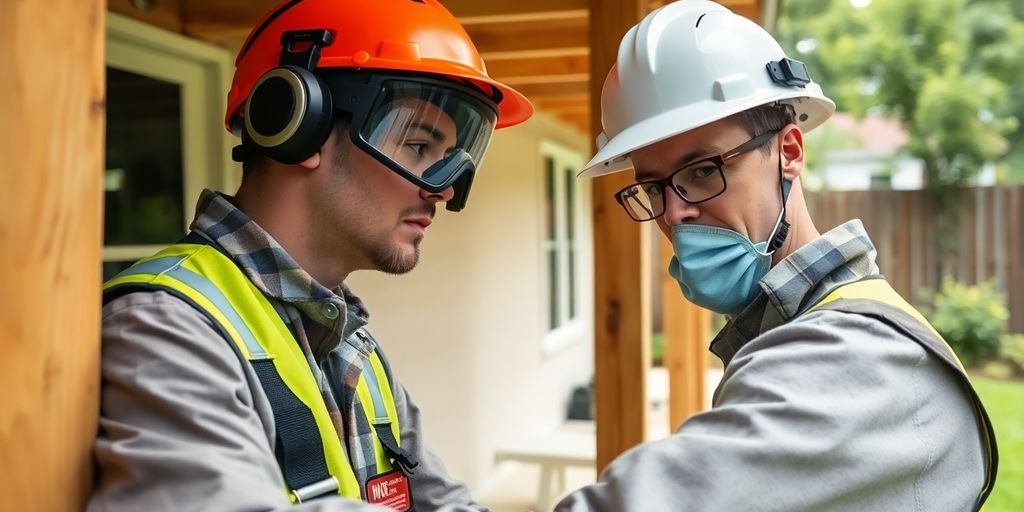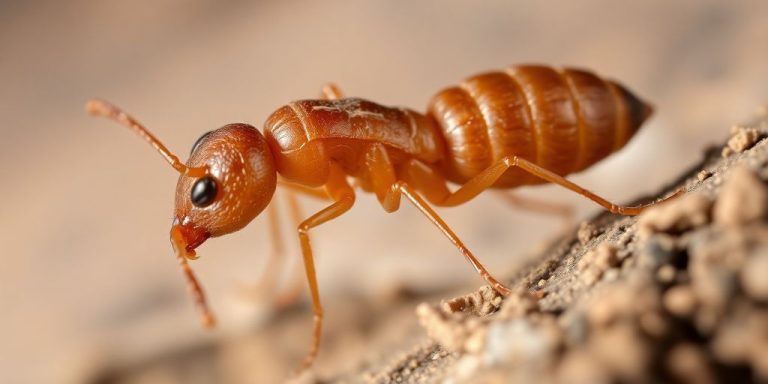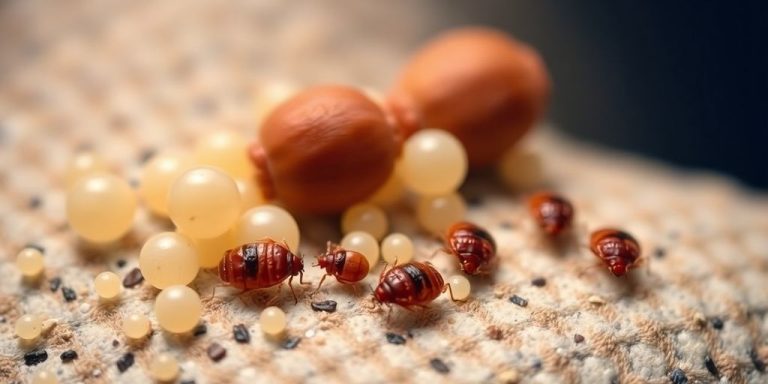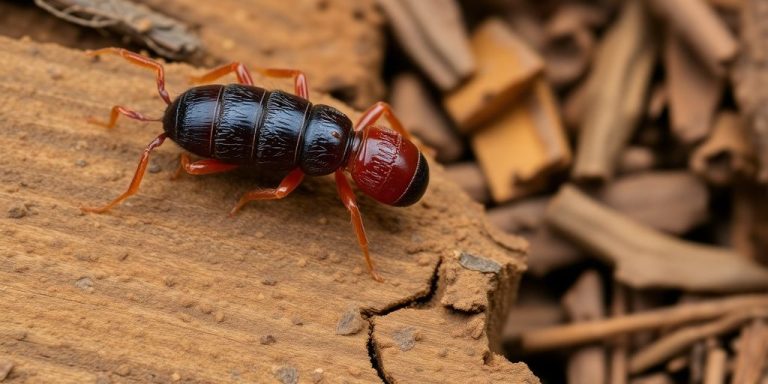Termite and pest control is essential for maintaining a safe and comfortable home. Without proper management, pests like termites can cause serious damage, leading to costly repairs. This article will explore effective strategies to protect your home from these unwanted invaders, ensuring you understand the basics, preventive measures, and the importance of professional assistance.
Key Takeaways
- Fix leaks and improve drainage to reduce moisture, which attracts termites.
- Store wood away from your house to prevent termite access.
- Regularly check for signs of pests and schedule inspections with professionals.
- Consider using eco-friendly methods and natural repellents for pest control.
- Educate your family about pest signs and prevention strategies.
Understanding Termite & Pest Control Basics
What Are Termites and Common Household Pests?
Termites are small insects that can cause significant damage to homes by eating wood and other materials. They often go unnoticed until the damage is severe. Common household pests include ants, roaches, and rodents, which can also create problems in your home. Understanding these pests is the first step in protecting your home.
The Importance of Early Detection
Early detection of pests is crucial. The sooner you identify a problem, the easier it is to manage. Here are some reasons why early detection matters:
- Prevents extensive damage
- Reduces treatment costs
- Minimizes health risks
Common Signs of Infestation
Recognizing the signs of an infestation can help you act quickly. Look for:
- Droppings or frass (termite droppings)
- Hollow-sounding wood
- Mud tubes on walls or foundations
Regular inspections can help catch infestations early, ensuring your home remains safe and sound.
By understanding the basics of termite and pest control, you can take proactive steps to protect your home from these unwanted invaders. Remember, a pest-free home is a happy home!
Preventive Measures for Termite & Pest Control
Eliminating Moisture Sources
Keeping your home dry is essential to prevent termites. Fix any leaks in plumbing, roofs, or foundations to reduce moisture. Here are some tips:
- Ensure gutters and downspouts direct water away from your home.
- Maintain proper drainage around your foundation.
- Use dehumidifiers in damp areas like basements.
Proper Ventilation Techniques
Good ventilation helps keep moisture levels low. Here’s how to improve ventilation:
- Install vents in attics and crawl spaces.
- Use exhaust fans in kitchens and bathrooms.
- Regularly check and clean vents to ensure they are not blocked.
Storing Wood Away from Home
Wood can attract termites, so it’s important to store it properly. Follow these guidelines:
- Keep firewood at least 20 feet away from your home.
- Elevate wood off the ground to prevent contact with soil.
- Avoid stacking wood against your house or in shaded areas.
By taking these preventive measures, you can significantly reduce the risk of termite infestations and protect your home from potential damage. Remember, early action is key to keeping your home safe from these pests!
Professional Termite & Pest Control Services

Benefits of Hiring Professionals
Hiring professionals for termite and pest control offers several advantages:
- Expertise: Trained technicians know how to identify and treat infestations effectively.
- Safety: Professionals use safe methods and products to protect your family and pets.
- Long-term Solutions: They provide ongoing services to prevent future infestations.
Types of Professional Treatments
There are various treatments available, including:
- Liquid Treatments: Applied to the soil around your home to create a barrier.
- Fumigation: A comprehensive method for severe infestations, where the entire structure is sealed and treated.
- Baiting Systems: These attract pests and eliminate them over time.
How to Choose a Reliable Service
When selecting a pest control service, consider the following:
- Experience: Look for companies with a proven track record.
- Reviews: Check customer feedback and ratings.
- Certifications: Ensure they are licensed and insured.
Remember, early detection is key to preventing extensive damage from pests. If you suspect an infestation, don’t hesitate to call for help.
In conclusion, professional pest control services can provide effective solutions to keep your home safe from termites and other pests. If you notice signs of infestation, such as mouse droppings in unexpected places, it’s crucial to act quickly to protect your home.
DIY Termite & Pest Control Strategies

Natural Remedies for Pest Control
Using natural methods can be a safe and effective way to manage pests. Here are some options:
- Diatomaceous Earth: This powder can kill termites by dehydrating them.
- Boric Acid: A common ingredient in many pest control products, it can be used to eliminate termites when applied correctly.
- Essential Oils: Oils like orange or neem can repel pests and are eco-friendly alternatives.
Setting Up Baiting Systems
Baiting systems are a great way to control termite populations. Here’s how to set them up:
- Choose Locations: Place bait stations near areas where you suspect termite activity.
- Monitor Regularly: Check the bait stations frequently to see if termites are feeding on the bait.
- Replace Bait as Needed: Ensure that the bait remains effective by replacing it when necessary.
Using Chemical Barriers Safely
Chemical treatments can be effective but must be used with care. Here are some tips:
- Follow Instructions: Always read and follow the label instructions on any chemical product.
- Wear Protective Gear: Use gloves and masks to protect yourself during application.
- Apply at the Right Time: Timing can be crucial; apply treatments during dry weather for best results.
By adopting these strategies, you can help protect your home from termites and other pests. Regular monitoring and maintenance are key to keeping your home safe.
In conclusion, while DIY methods can be effective, they require diligence and care. If you find yourself overwhelmed, consider reaching out to professionals like Flatline Pest Control, who offer tailored solutions for pest management.
Innovative Techniques in Termite & Pest Control
Latest Technological Advancements
In the world of pest control, technology is making a big difference. New tools and methods are being developed to help keep homes safe from termites and other pests. Using advanced detection systems can identify infestations early, which is crucial for effective treatment. For example, thermal imaging cameras can spot heat changes in walls, indicating hidden termite activity.
Eco-Friendly Pest Control Solutions
More people are looking for natural ways to deal with pests. Eco-friendly solutions are not only safer for the environment but also effective. Here are some popular options:
- Diatomaceous earth: A natural powder that kills pests by damaging their exoskeletons.
- Essential oils: Certain oils, like peppermint and tea tree, can repel pests.
- Beneficial insects: Introducing natural predators can help control pest populations.
The Role of Home Warranty Plans
Home warranty plans can provide peace of mind when it comes to pest control. These plans often cover the costs of pest inspections and treatments, helping homeowners avoid unexpected expenses. Having a warranty can save you money in the long run, especially if an infestation occurs.
Regular maintenance and inspections are key to preventing pest problems. By staying proactive, homeowners can protect their investments and ensure a safe living environment.
In summary, innovative techniques in termite and pest control are essential for keeping homes safe. By embracing technology, eco-friendly solutions, and home warranty plans, homeowners can effectively manage pest issues and maintain a pest-free environment.
Maintaining a Pest-Free Home Environment

Regular Inspections and Monitoring
Consistent inspections are key to keeping your home safe from pests. Here are some steps to follow:
- Conduct annual inspections to find any signs of pests early.
- Use monitoring stations around your home to check for pest activity.
- Regularly check these stations for any signs of trouble.
By staying vigilant, you can catch problems before they become big issues.
Educating Your Household
It’s important to teach everyone in your home about pest prevention. Make sure they know:
- What signs to look for.
- How to report any concerns.
- The importance of keeping the home clean.
A team effort makes pest control more effective.
Designing a Termite-Resistant Landscape
Your yard can help keep pests away. Here are some tips:
- Choose plants that repel termites, like marigolds and mint.
- Keep trees and shrubs at a safe distance from your home.
- Regularly check mulch to ensure it doesn’t create a moist environment that attracts pests.
Keeping your home and yard clean is essential for preventing pests. A clean home is less appealing to pests, making it easier to keep them away.
Materials and Construction Techniques for Pest Prevention

Using Termite-Resistant Materials
Utilizing termite-resistant materials is essential for safeguarding your home against these pests. Concrete is a top choice as it cannot be eaten by termites, making it a strong foundation material. Additionally, certain types of wood, such as cedar and pressure-treated wood, naturally resist termite infestations due to their unique properties.
Implementing Physical Barriers
Creating physical barriers can effectively prevent termites from accessing your home. Here are some strategies:
- Install termite-resistant screens on windows and doors to block entry.
- Use steel mesh or sand barriers around your home’s perimeter to deter termites.
- Consider physical termite shields during construction to protect your foundation.
Proper Sealing and Insulation
Sealing gaps and ensuring proper insulation can help keep termites out. Regularly check for cracks in walls and foundations, and seal them promptly. This not only prevents pest entry but also improves energy efficiency in your home.
Maintaining a pest-free environment requires ongoing vigilance and proactive measures. Regular inspections can help catch any potential issues early, ensuring your home remains safe from infestations.
Summary Table of Termite-Resistant Materials
| Material Type | Resistance Level | Common Uses |
|---|---|---|
| Concrete | High | Foundations, patios |
| Cedar Wood | Moderate | Decks, fences |
| Pressure-Treated Wood | High | Outdoor structures |
| Steel Mesh | Very High | Perimeter barriers |
Conclusion
In conclusion, protecting your home from termites requires a smart and proactive approach. By combining early detection, regular inspections, and effective prevention methods, you can create a strong defense against these damaging pests. Remember to keep your home dry and well-ventilated, store wood away from your house, and seek professional help when needed. A pest-free home is not just about comfort; it also helps maintain your property’s value. By following the strategies discussed in this article, you can ensure your home remains safe from termite invasions for years to come.
Frequently Asked Questions
What are termites and why are they a problem?
Termites are tiny insects that eat wood and can cause serious damage to homes. They can go unnoticed for a long time, leading to expensive repairs.
How can I tell if I have a termite infestation?
Look for signs like mud tubes on walls, discarded wings, or hollow-sounding wood. If you notice these signs, you might have termites.
What can I do to prevent termites?
To prevent termites, fix any leaks, keep wood away from your home, and ensure proper ventilation to reduce moisture.
Should I hire a professional for pest control?
Yes, hiring a professional can provide expert help in identifying and treating infestations effectively.
Are there natural ways to control pests?
Yes, you can use natural remedies like diatomaceous earth or essential oils to deter pests without harsh chemicals.
How often should I have my home inspected for pests?
It’s a good idea to have your home inspected at least once a year to catch any issues early.




